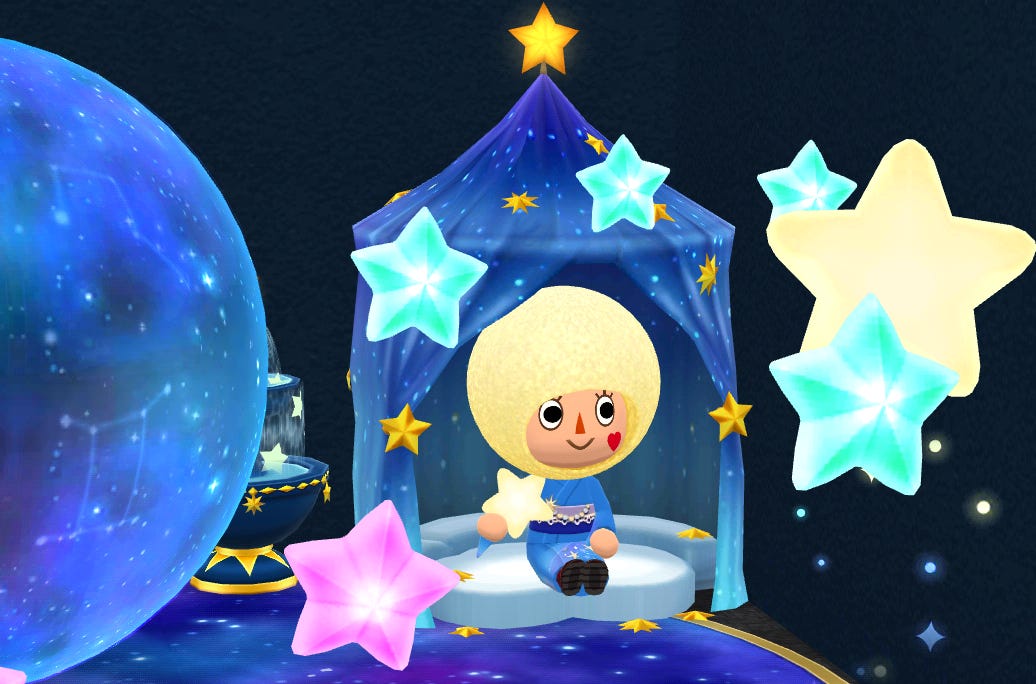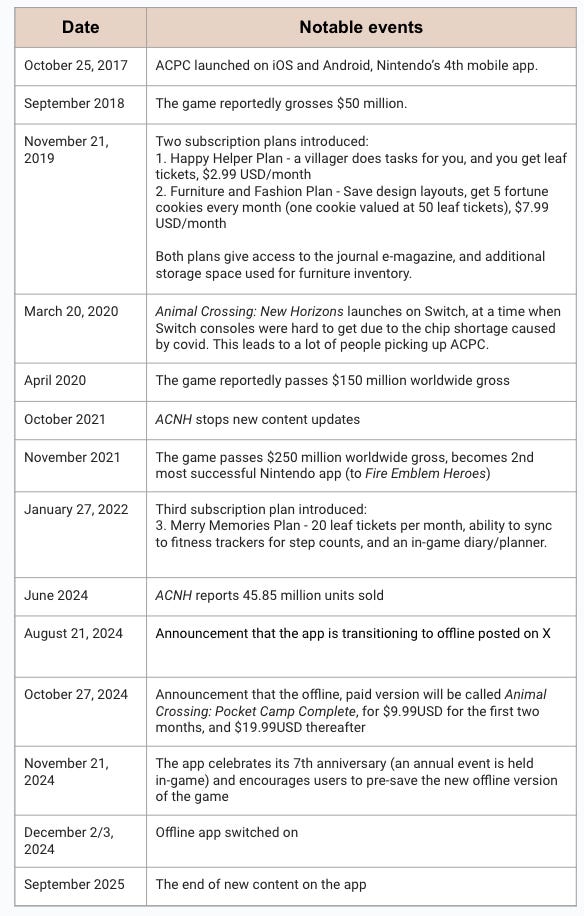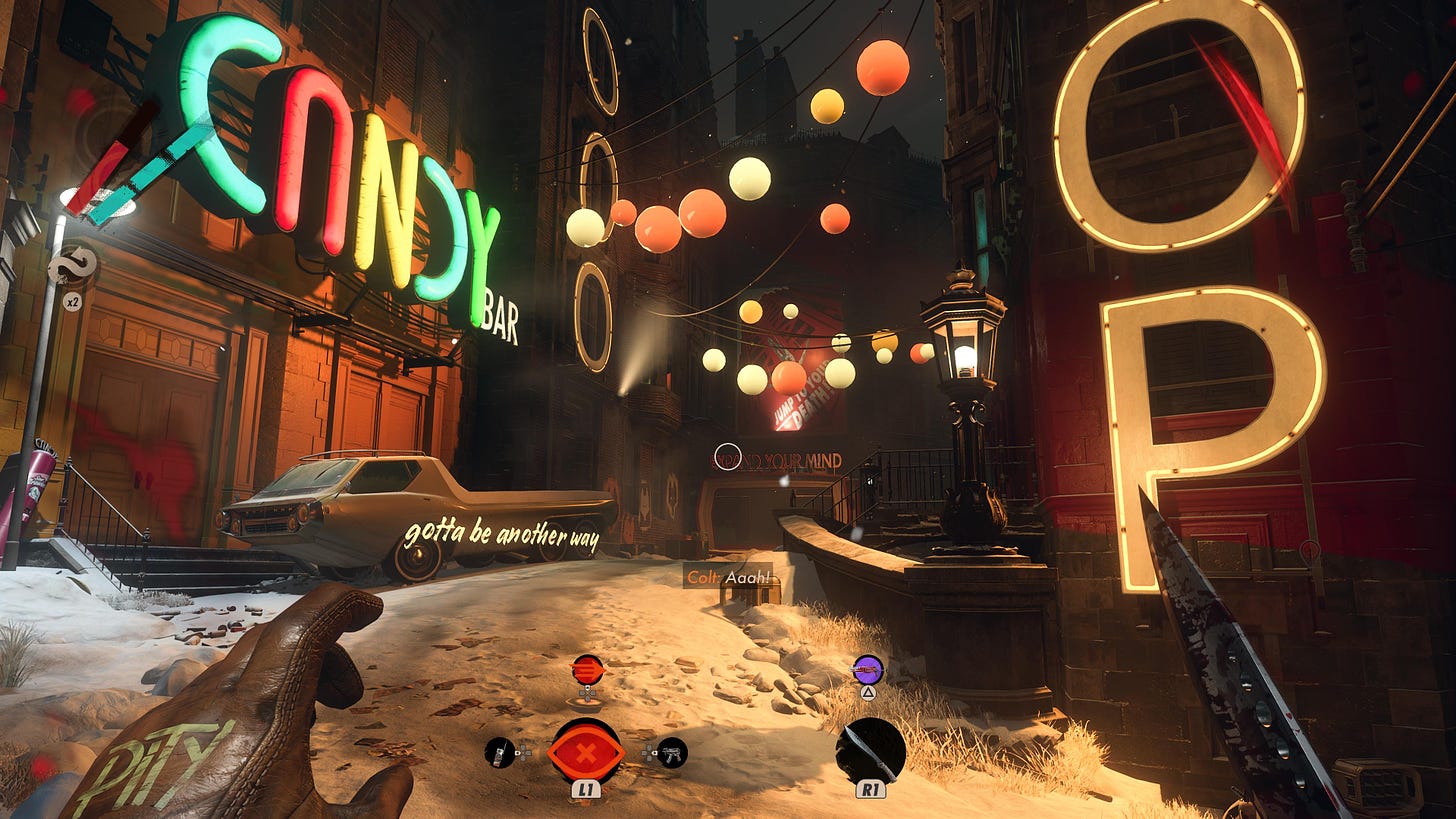How Nintendo closes up shop: Inside the sunset of Animal Crossing: Pocket Camp
And my go-to recommendation to scratch that shooter itch.
Nintendo has to be the gaming industry’s most unpredictable company. In 2017, after years of resisting pressure to do so, the gaming giant released a trio of mobile games leveraging its hot intellectual property: Super Mario Run, Fire Emblem Heroes and Animal Crossing: Pocket Camp.
All three ticked away with similar business models. You could initially play them for free, and then upgrade your experience with a combination of a subscription or purchase in-game new content with microtransactions. This year, the company announced that it would be ending ongoing support for one of those games, Animal Crossing: Pocket Camp, moving it to an offline model with a one-time purchase.
It piqued the interest of Kayla Medica, a player of the game and specialist business-to-business marketer — who runs her own Substack, Mehdeeka. We sat down and discussed what it all means and why it's interesting from both a marketing and gaming perspective.
I started by asking: So, Kayla, what's going on with Animal Crossing: Pocket Camp?
Enjoying this newsletter? Help me grow it! Forward it to a friend’s inbox or share a link on your socials.
KAYLA: So, two fairly common things are happening which, in combination, is actually a rare event. The first is that the Animal Crossing: Pocket Camp app has just been transitioned to an offline version, and the second is that we’re witnessing a very public and large closure of a Software-as-a-Service business unit.
Usually, subscription services die in darkness, often because they haven’t found product market fit and no one ever notices let alone documents it. But, given this is a Nintendo product, we’re getting a really deep look at what actually goes into the process of closing up shop, and we also get a good look at performance metrics, including financials, from which we can take some estimated guesses at what’s happening behind the scenes.
HARRISON: OK, that is interesting. Nintendo has been known to sunset products on occasion and doesn’t really do long-term support for games or services like other companies. Most of its games, after all, operate offline. It’s mobile games have been a unique exception to this until now.
Where we do tend to hear about this is with its online stores. The Wii U eShop was closed last year. Perhaps the key difference here is that Nintendo doesn’t like to let its product limp along. For contrast: The Playstation 3 store is falling apart, and can’t take payments via card anymore.
Back to Animal Crossing: Tell me a bit more about this closing process? What are we seeing?
KAYLA: The closure was announced in August, with only three months' lead time. For ACPC in-game notifications of changes this big, this is really quick. Players noted that simple maintenance notices would sometimes get more lead time than this.
It was announced first on X (notably, this post isn’t pinned) and in-game, and the reception to it was pretty split depending on which community you went to. I’m a big redditor, and I’ve been in the r/ACPocketCamp sub since I first started playing in March 2020 (shout out to the New Horizons FOMO x Switch/chip shortage), so the first reactions I saw were almost akin to grief.
Checking the r/Nintendo sub however, there’s a very different sentiment of “at least they’re not discontinuing the game completely, this is a great way to end things.”
Nintendo have drip fed updates since then, mostly covering how to make sure you don’t lose your data, some changes, some features that will be totally discontinued, and that sort of thing – but there are still lots of posts in the r/ACPocketCamp sub with niche, unanswered-by-Nintendo questions.
The launch and closure of Animal Crossing: Pocket Camp
HARRISON: That’s a good jumping point to discuss Nintendo’s general approach to communications -- at least from a PR perspective. About a decade or so back, Nintendo pulled away from general press releases and using the media as a primary channel of communication. Now, it relies on blog posts and videos (Nintendo Directs) which then the media amplifies via republishing and quoting it as a source.
This is generally because every little thing Nintendo does is a story -- and can affect investor sentiment and potentially its share price in Japan. There’s an immense amount of coverage this company receives daily that would make some of Australia’s largest firms -- perhaps even the global tech giants -- blush. It controls the message by limiting the number of primary sources for it. This kind of communication approach however, isn’t as effective for managing users or the closure of ongoing services -- something that Nintendo as a company doesn’t do a lot of anyway.
If I compare it to other online service-based games that I play: Almost every announcement is followed by an EDM campaign, social media messaging and now (because I’ve moved into being a press target for them too) a press release with the same message usually a day later. That said, this is all for new content, not for information about anything they are closing down or cutting off. What else could Nintendo do here Kayla? And how is the community reacting to the news?
KAYLA: The first community reaction that comes to mind is quite dramatic. The online connection going down means players can’t interact with their friend list - it doesn’t update automatically anymore. In its place though, there’s a new feature where you can collect other player’s “trading cards” which feature an image of their character. Leading up to the release of the offline version which was just a few days ago, people didn’t know if the cards will update if they change their outfits, so there’s been a lot of chatter around “death outfits” – i.e. the last outfit people will see them in, immortalised forever in the player card.
From a comms and marketing standpoint, I think Nintendo has followed a pretty standard process in terms of shutting a service, that is:
Announcement and multiple reminders
Find and offer an alternative service
Offer a limited discount to that alternative as a show of thanks (the game will cost $9.99 for two months, and then $19.99 thereafter)
The bigger business question is what is the strategy here? Usually a closure means a failed business, or no longer having the resources to upkeep a service. In SaaS it’s a lack of product market fit, or having that fit but not being able to sustainably monetise it.
From the lack of retargeting and growth campaigns, it doesn’t seem like Nintendo was gunning for huge growth ambitions – ACPC was never that heavily advertised. It doesn’t get paid advertising the way their console games do. From the revenue reports, ACPC has grossed more than $250M worldwide, as of November 2021. There may have been steady decline of revenue in the three years since then, but since it’s a seven year old game, surely it had covered its startup costs, and revenue would then be reflective of how much effort they put into continuing to promote it and find new “whales” willing to spend thousands on microtransactions.
So, one final question for you, Harry, what is the business strategy of gaming? Why do some games end, and some get continuous updates?
HARRISON: Game companies are weird Kayla. Like most businesses, it generally comes down to cost versus return. So if a game service is costing money to both run and maintain, but isn’t generating a financial return, then it can be on the chopping block. There are plenty of live service games that are shut down as the community moves on.
But not always. Larger gaming companies are heavily influenced by the whims of their fans. On occasion, they are willing to take a loss, or run a product with a low margin if it serves the community.
Consider Pokemon Home — an online service that allows you to save and move Pokemon that you’ve captured across various Pokemon games. That launched years ago, it’s unclear whether it’s growing or making any kind of profit -- it costs around $25 a year for its premium plan. That app may break even considering the server costs required for it. I’d suspect usage would also tend to suffer when there’s no new mainline Pokemon games, as there hasn’t been for a few years now. But if Nintendo shut that down it would cause an absolute outrage. Even casual users may have years worth of hard-earned Pokemon stored there.
It’s what makes this news around Animal Crossing: Pocket Camp so curious. Unless something is really draining the company, it tends to do its best to maintain any launched services for the sake of keeping gamers happy. The offline version is likely a compromise, it allows them to keep the game going in some capacity, without needing to invest further resources needed to justify charging an ongoing subscription with micro-transactions. Any closing thoughts from you Kayla as we wrap this up?
KAYLA: Personally, I’m really interested to see how this pans out over the next 12-18 months, especially once the content updates stop. Initial reaction to something, particularly something that no one has their hands on yet, isn’t always an accurate indicator of what the sentiment will be once it’s available. When the app actually released earlier this week, it surprisingly included a feature from New Horizons where players can customise their clothing and it’s been met with an overwhelmingly positive response.
Animal Crossing is a larger brand with multiple other game instalments; maybe this means something new is coming? The Switch 2 is eagerly anticipated, maybe there’s something in the timing and we just aren’t privy to that information.
What do you think about Nintendo’s approach here? Should they have done more to keep Animal Crossing: Pocket Camp alive? Is taking it offline the right move. Let us know in the comments.
What I’m playing: Deathloop
With November's latest Call of Duty release on the brain, I'm getting a lot of queries from mates on whether there are any other interesting shooters out there worth their time. Several times this month I've been asked: "When's the new BioShock coming out?". To which I tell them that it's not. And that a new game from the same studio lead, Judas, may be out next year.
Then I point them to Deathloop, a 2021 game developed by Arkane — the makers of the Dishonoured franchise. This is a shooter with the premise of Groundhog Day. Playing as Colt, you are stuck in a time loop and need to assassinate eight people within the day to break it. They know you are coming, are armed to the teeth, and some have crazy powers too. But it makes for a great puzzle of a shooter game.
You are one of a handful of people in the loop that actually remembers each run of the loop — it resets almost everyone else's memory. There's one other character though, Julianna, who is also clued in and is trying to protect your targets.
The catch is: You can actually play as Julianna and invade other players' games if you like. It's a neat twist. While you are usually facing off against a computer-controlled Julianna, three years from release, I can confirm that there are still real players out there willing to hunt you as her if you play the main Colt campaign. In fact, a few too many of them. Even second run of a stage that I’ve played so far has been invaded by another real-life player, likely due to a lack of others on the game. You can turn this off.
Back playing as Colt, and there's only one solution to breaking the loop. This is both a strength and a weakness as it means the game plays very tightly and guides players through rather nicely. But, it limits how replayable the game is once you know the solution. This said, three years on from first playing it, I'm still finding small things that I missed the first time around.
Mechanically, it's a great superpower-enhanced shooter, very similar to BioShock. The gunplay is crisp and there's a decent variety of weapons and upgrades to keep things interesting. The levels are also incredibly intricate with plenty of small nooks and crannies to discover for dedicated players.
It feels like the game was built to prioritise stealth — makes sense given Dishonoured was really game built around sneaking. This time around, however, I've gone in guns blazing to see how it would hold up if you choose to take the loud approach. And it actually works well. Initially, Colt is a little fragile. But this can be rectified with the right upgrades and, regardless, you get three 'lives' per run — with an added option to increase this in the difficulty menu.
Perhaps the biggest strength of this game is its writing and voice acting. The banter between Colt and Julianna is always on point and hilarious. The writing and characterisation of the eight assassination targets (or "visionaries" as they are called in-game) is fantastic too. These aren't two-dimensional Bond villains. They are deeply human. They have crushes and relationships with one another, some hate each other, and have competing priorities which you unravel as you play the game. After all, learning about the visionaries is part of solving the mystery of the loop.
Arkane hit a bit of a roadblock with their latest game, a vampire shooter that flopped on release. Deathloop was their last big hurrah, and it's a shame there's been no additional content planned for it. I would love a new game plus mode, with an alternate solve for the loop.
But if the latest Call of Duty — with its ten-hour campaign — only gave you an itch for more gunplay, then give Deathloop a crack. Given it's three years old, it's likely on sale and well worth your time.
Worth trying if you like: The Call of Duty series, the Bioshock triology, Doom Eternal.
Available on: PlayStation 5, Xbox Series X and Series S, Microsoft Windows, Xbox Cloud Gaming, GeForce Now
Thanks for reading. If you enjoyed this post, and want to help me grow Infinite Lives, flick this email to someone in your network. Catch you next week!









I’m of the same mind. It’s why I’ve never really gotten into mobile games in general. It’s all about capturing the whales and casual players. More minor daily interactions, less meaningful ones.
The chart is Kayla’s work! I mentioned this on LinkedIn, but she sure glowed up my reporting!
Another great piece and loved the interview angle. I doubly appreciated the chart as I was reviewing the legs of this game. I loathe IAP/microtransactions and dislike the mobile game economy since games just evaporate. I can, however, at least acknowledge Nintendo's efforts to keep these games available in some capacity.